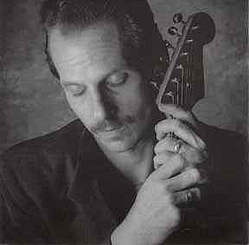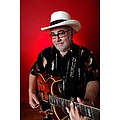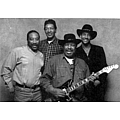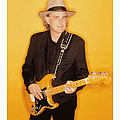Ronnie Earl Biography
RONNIE EARL was born Ronald Horvath in Queens, NY, on March 10, 1953 (descending from a Hungarian immigrant family). He studied music composition in college, and moved to Boston University in 1975 to pursue a Master's Degree in Special Education, teaching handicapped children. In the early '70s he became fascinated with the local blues scene. It was at this time that he attended a Muddy Waters concert at the Speakeasy Club in Cambridge, MA, which mesmerized him so much he took up guitar (at the age of 22!). Developing his craft quickly, he changed his last name to the bluesier-sounding Earl in tribute to Earl Hooker, one of his favorite influences. Prior to the name switch, he'd made some recordings for the small Baron label under his original moniker beginning in 1977, first backing Guitar Johnny & the Rhythm Rockers, then as a founding member of Sugar Ray & the Bluetones with harmonica player/singer Sugar Ray Norcia. In 1979, Earl was invited to replace Duke Robillard in the prominent Providence, Rhode Island band Roomful of Blues, whose swinging jump blues revivalist sound demanded a jazz sensibility as well as ample blues feeling. The technichally deft and musically encyclopediac Robillard took Earl under his wing. The result was a jazzy, soulful blues style, as well as his slow burn style which fans found both mesmerizing and exhilarating. Earl spent the next eight years with Roomful of Blues and watched their national profile grow steadily larger. Meanwhile, Earl also made a few recordings on his own for Black Top Records, forming the first versions of the Broadcasters in the early '80s that focused on blues instrumentals, which few artists had ever attempted. He released his first solo album, Smokin', in 1983 and followed it with They Call Me Mr. Earl in 1984 (both of those albums were later compiled on the CD Deep Blues). The vocalists adorning The Broadcasters included Kim Wilson, Darrell Nulisch, and Sugar Ray Norcia. During Ronnie Earl's Roomful of Blues tenure, there were several albums featuring classic R&B legends, such as Eddie 'Cleanhead' Vinson, Big Joe Turner, and Earl King. Ronnie left Roomful on a very high note with 1987’s Live at Lupo's. He began collaborations with contemporaries Ron Levy and Jerry Portnoy, Earl King, Jimmy Rogers, and Jimmy Witherspoon. Deciding to devote all his energies to his solo career, 1988 would see the completion of Soul Searchin' which would re-unite Earl and Duke. Of special note, it greeted many of Ronnie’s most enduring compositions, After All, It's My Soul, Ships Passing In the Night, and You're The One. By this time The Broadcasters were culled down to a 3-piece unit: Bruce Katz, Per Hanson, and Rod Carey. The instrumental albums that emerged (Language of the Soul, Still River, Blues Guitar Virtuoso, Blues and Ballads, Color of Love) would take the Blues world by storm. A new version of the Broadcasters debuted in 1988 on Soul Searchin', which featured vocalist Darrell Nulisch, harmonica player Jerry Portnoy (ex-Muddy Waters), bassist Steve Gomes, and drummer Per Hanson. Peace of Mind followed in 1990, as did I Like It When It Rains, a live album on Antone's that actually dated from 1986. 1991's Surrounded by Love reunited Earl with Sugar Ray Norcia and also proved the last in his long string of Black Top releases. By the early '90s, Earl had addressed and overcome his problems with alcohol and cocaine and began to rethink his approach. He formed a new version of the Broadcasters, featuring organist Bruce Katz, bassist Rod Carey, and longtime drummer Per Hanson, and boldly elected to go without a vocalist. Earl debuted his new instrumental direction – which was more informed by jazz than ever before – on 1993's Still River (released by AudioQuest) and embarked on a tour of Europe. He signed with the Bullseye Blues label and issued a string of acclaimed albums, including 1994's Language of the Soul, 1995's Blues Guitar Virtuoso Live in Europe (a live album from his 1993 tour originally titled Blues and Forgiveness), and 1996's Grateful Heart: Blues and Ballads (which featured David "Fathead" Newman). The latter two were particular critical favorites, with Live in Europe winning Pulse magazine's year-end poll as Best Blues Album and Grateful Heart doing likewise in DownBeat. In 1996, Downbeat Magazine chose 'Grateful Heart-Blues and Ballads' as Blues Album of the Year and Ronnie Earl was awarded the WC Handy Award for Best Blues Guitarist. 1997’s 'Color of Love' on Verve, produced by legendary producer Tom Dowd. Thanks to all the positive attention, Earl signed a major-label deal with Verve. His label debut, The Colour of Love, was issued in 1997 and sold more than 65,000 copies, making it one of the biggest hits of Earl's career; that year, he also won a W.C. Handy Award as Best Blues Instrumentalist. He began teaching guitar at Berklee College of Music in 1992, and has released instructional videos. However, in the late 90's , Ronnie was diagnosed with depression, forcing him to cut back on his performances. He continued to work actively as a teacher and instructor, and also performed at facilities for the mentally ill, reaching back to his days as a special education teacher. He wound up not only leaving Verve, but taking a break from bandleading and live performance; he disbanded the Broadcasters and signed with the smaller Telarc label as a solo act. His Telarc debut, 2000's Healing Time, teamed him with legendary soul-jazz organist Jimmy McGriff. The follow-up, 2001's Ronnie Earl and Friends, was a loose, jam session type of affair featuring a number of special guests, including the Fabulous Thunderbirds' Kim Wilson, Irma Thomas, Luther "Guitar Jr" Johnson, and the Band's Levon Helm. In 2003, Earl returned with an album of mainly instrumental material I Feel Like Goin' On on the Canadian based label Stony Plain. A second album from Stony Plain, Now My Soul, appeared in 2004, while a third, The Duke Meets the Earl, which paired Earl with fellow ex-Roomful of Blues guitarist Duke Robillard, was released in 2005. (compilation text based on Wikipedia, Gary Tate/LivinBlues and Steve Huey/All Music Guide)
Ronnie Earl Lyrics
Write a comment
What do you think about Ronnie Earl? Let us know in the comments below!
Ronnie Earl Albums
| Title | Release | ||
|---|---|---|---|
| 1 | Ronnie Earl Plays Big Blues |
Similar artists
- Duke RobillardBlues/Jazz
- Jimmy ThackeryBlues
- Tab BenoitBlues/Rock
- Dave HoleBlues/Rock
- Hubert SumlinBlues
- Albert CollinsBlues/Rock
- Tinsley EllisBlues/Rock
- Coco MontoyaBlues/Rock
















